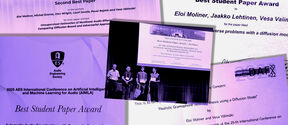Students improved deicing operations at Helsinki Airport

The Finnish airport operator, Finavia, responsible for Helsinki Airport and 20 other airports across Finland, commissioned a team of Aalto University students to enhance the deicing process. This procedure is crucial for ensuring aircraft safety and maintaining seamless travel, particularly in Finland's harsh winter climate.
The student team, comprising Anushka Chaturvedy (Master's Programme in Computer, Communication and Information Sciences, School of Science) and Xiaochun Yang (Master's Programme in Global Management, School of Business) worked under the guidance of Professor Heikki Peura from the School of Business and in close collaboration with Apron Development Specialist Mika Nevalainen from Finavia.
Their work involved conducting eight in-depth interviews with Finavia's Apron Management Team, which provided critical insights into the organization's structure and the specific challenges encountered during deicing operations. Data collection and model development spanned March and April, culminating in the final delivery of the project mid-May.
Data-driven innovations
To craft a tailored solution for Helsinki Airport, the team benchmarked its operations against other airports in cold regions with similar traffic volumes. This analysis identified best practices in Apron Management, forming the basis for solutions uniquely suited to Helsinki's needs.
Central to the project was the development of a predictive model for forecasting flight departure delays. Utilizing a comprehensive dataset from Helsinki Airport, covering the period from 2015 to March 2024, the team built a deep learning model that accounted for variables such as peak hour traffic, ground process delays, and weather conditions. The model's performance metrics demonstrated high accuracy, offering powerful statistical insights.
Finavia responded positively to the model, recognizing its potential to enhance efficiency by providing a clearer understanding of flight patterns and the impact of weather on operations. Accurate delay predictions enable more informed decision-making, leading to smoother, more cost-effective operations.
‘The model developed by the students served as an excellent proof of concept, showcasing the significant potential of predictive analytics in our deicing operations. We are excited about the possibilities it opens and look forward to further developing and integrating this approach into our operations for even greater efficiency and reliability,’ said Kristian Alaviuhkola, Apron Control Duty Manager at Finavia.
The Aalto team also offered recommendations based on benchmarking and model results. They suggested redesigning workflows to boost efficiency, streamlining deicing processes, and standardizing procedures to enhance operational clarity and management.
Professor Heikki Peura praised the students' contributions and said that Anushka and Xiaochun brought the perfect blend of business acumen and data science expertise to this project. ‘They swiftly navigated the complexities of airport apron management, delivering a cohesive set of structural and data-driven recommendations.’
A successful collaboration project
The partnership between Finavia and Aalto University has yielded valuable insights and practical solutions. Finavia now benefits from a data-driven approach to predict workload, while Aalto University students gained hands-on experience tackling real-world industry challenges. This collaboration highlights Finavia's commitment to continuous operational excellence, improving the travel experience at Helsinki Airport.
‘This project has clearly demonstrated how predictive analytics can transform our deicing processes,’ added Anssi Väisänen, Head of Apron Management at Finavia. ‘Our collaboration with Aalto University has been immensely valuable, with the students bringing fresh perspectives and advanced techniques that have helped us identify new ways to optimize our operations and establish a strong foundation for future innovations.’
This news item was originally published on the Aalto University website on 21.10.2024
Read more news
A survey on users' experiences of Mykanta in collaboration between Aalto University and Kela
Senior university lecturer Sari Kujala's research group is exploring, in collaboration with Kela, users' experiences with the Mykanta online patient portal and the MyKanta mobile application.
Specialised AI models could be Finland's next global export
Finland has the potential to build AI solutions that are different from ChatGPT-like large language models. Aalto University's School of Electrical Engineering already has decades of experience in developing specialised, resource-efficient AI models. They could be a key component of future 6G networks, automation, and industrial systems – and the next competitive edge of our country.
Professor Patric Östergård becomes a member of the Finnish Society of Sciences and Letters
Finnish Society of Sciences and Letters is Finland's oldest science academy. It promotes scientific discussion, publishes scientific literature, awards prizes and provides financial support for research.